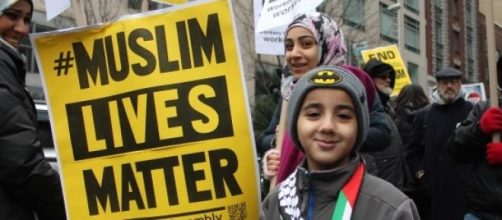In a quiet town of North Carolina, a little after five in the afternoon on the 10th of February, two women call 911 to report screaming and gunshots. We are in Chapel Hill, a short distance away from the University of North Carolina. By the time the police arrives, three students are dead, all of them muslims.
Deah Shaddy Barakat, 23, his wife Yusor Mohammad Abu-Salha, 21, and her sister Razan Mohammad Abu-Salha, 19, were shot in the head by a man who described himself as an 'anti-theist' on social media. The man, going by the name of Craig Stephen Hicks, turned himself in to the sheriff's deputies on the night of the murders.
According to Chapel Hill police, the initial investigation suggested the crime was motivated by a parking dispute. To the two girls' father, it had "hate crime written all over it," as he said at the victims' funeral.
On Twitter, the delay of the media's response sparked collective outrage, and the hashtag #ChapelHillShooting was used nearly a million times, accompanied by #MuslimsLivesMatter.
"The biggest crime is the fact that the TV news, which most people still receive coverage through, didn't cover it in the same way the Charlie Hebdo attacks were, because Muslims are at the receiving end of the terrorist attack," says Sabby Dhalu, organiser of the Stand up to Racism campaign. "There is clearly an agenda taking place whereby Muslims are always portrayed as the perpetrators," she adds.
On the day following the shooting, her organisation 'United Against Racism' urged protesters to gather outside the BBC in London to highlight the lack of media attention. In similar events, hundreds marched from the CNN offices to Fox News' headquarters in New York City on Saturday.
In the UK, media's biases against Muslims aren't new. According to Simon Hooper, a freelance journalist for Al Jazeera online, it all started after the 9/11 terrorist attacks in the United States. "The security concerns meant that far more British people were looking at Muslims and associating them with issues to do with security and safety in a way that they hadn't done before," he says. And the general sentiment of suspicion shifted away from the Irish associated with the IRA bombings and onto the Muslim community.
It was showed in October of last year how media's emphasis on immigration issues have misled the British public. In an Ipsos Mori survey, Britons were asked "Out of 100 people, how many do you think are Muslim?" The answer averaged around 20%, yet the actual percentage of Muslims in the UK is 5% - less than one in twenty.
It isn't clear whether the media instigated the pattern or simply adapted their narrative to the growing public fear. But figures are clear: Muslims don't benefit from the same opportunities as other communities in the UK.
In the past decade, the Muslim community in Britain has risen by over a million, reaching almost three million at the time of the 2011 census. Yet in its latest report entitled 'British Muslims in Numbers', the Muslim Council of Britain found that only one in five Muslims in the country is in full-time employment - compared to one in three of the wider population.
The report, led by Ali Sundas of the University of Oxford, stated: "The higher levels of unemployment amongst Muslims as compared to the overall population are the outcome of numerous factors, however there is now enough evidence of the double penalty faced in entering the labour market - of racial discrimination as well as Islamophobia."

